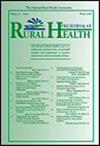People living in rural areas often experience limited access to health resources, slow knowledge diffusion, and geographical isolation, and tend to be at higher risk for poor physical and mental health outcomes compared with nonrural populations. It is unclear, yet, how the concept of “rural” shapes observed differences from nonrural populations. We aim to develop a psychometrically sound scale to assess key dimensions that constitute individual-level perceived rurality.
We first conducted a broad literature review to identify a priori concepts related to rurality and adapted survey items measuring relevant constructs, such as loneliness, attitudes toward people living in rural areas, and perceived social membership. We used these conceptual constructs and measures to develop a survey questionnaire focused on rural perceptions. We recruit residents in 3 rural states: Kentucky, New Hampshire, and Vermont. Using the explorative factor analysis and second-order measurement model in the structural equation model framework, we developed a rural perception scale consisting of 18 items.
We recruited 1,384 participants (n = 686 from KY; n = 698 from NH/VT) using Amazon Mechanical Turk (n = 897, 64.8%) and social media paid ads (n = 487, 35.2%). The average age of participants was 41 years old (SD = 15); 54.7% of respondents had less than college graduate education, and 94.2% reported their race as non-Hispanic White. Majority of the participants were from Rural Urban Commuting Area (RUCA)-designated urban areas (n = 798, 57.7%), followed by RUCA-designated large rural areas (257, 18.6%), RUCA-designated rural areas (n = 174, 12.6%) and RUCA-designated isolated areas (n = 133, 9.6%). Our final model revealed 4 latent constructs: “belonging” (Cronbach's α = 0.896), “attitudes toward rural life” (Cronbach's α = 0.807), “loneliness” (Cronbach's α = 0.898), and “community social ties to people in their community” (Cronbach's α = 0.846).
We identified 4 subfactors of the umbrella concept of rurality that explain how people in rural regions may perceive being in rural environments and having rural lifestyles.


